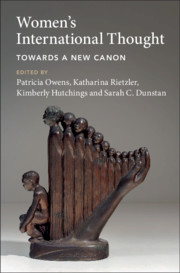Book contents
- Women’s International Thought: Towards a New Canon
- Women’s International Thought: Towards a New Canon
- Copyright page
- Contents
- Preface and Acknowledgments
- Introduction
- 1 Field and Discipline
- 2 Geopolitics and War
- 3 Imperialism
- 4 Anticolonialism
- 5 International Law and International Organization
- From The New State (1919)
- From A Monograph on Plebiscites (1920)
- From Must the League Fail? (1932)
- From “Socialism and Federation” (1941)
- From The Identity and Continuity of States in Public International Law (1954)
- From International Relations (co-written with Hugh B. Killough) (1956)
- From The Constitution and Government of Ghana (co-written with Leslie Rubin) (1961)
- From Refugees: A Problem of Our Time (1975)
- Mary Parker Follett
- Sarah Wambaugh
- Lucie A. Zimmern
- Barbara Wootton
- Krystyna Marek
- M. Margaret Ball
- Pauli Murray
- Louise W. Holborn
- 6 Diplomacy and Foreign Policy
- 7 World Peace
- 8 World Economy
- 9 Men, Women, and Gender
- 10 Public Opinion and Education
- 11 Population, Nation, Immigration
- 12 Technology, Progress, and Environment
- 13 Religion and Ethics
- Index
M. Margaret Ball
from 5 - International Law and International Organization
Published online by Cambridge University Press: 12 April 2022
- Women’s International Thought: Towards a New Canon
- Women’s International Thought: Towards a New Canon
- Copyright page
- Contents
- Preface and Acknowledgments
- Introduction
- 1 Field and Discipline
- 2 Geopolitics and War
- 3 Imperialism
- 4 Anticolonialism
- 5 International Law and International Organization
- From The New State (1919)
- From A Monograph on Plebiscites (1920)
- From Must the League Fail? (1932)
- From “Socialism and Federation” (1941)
- From The Identity and Continuity of States in Public International Law (1954)
- From International Relations (co-written with Hugh B. Killough) (1956)
- From The Constitution and Government of Ghana (co-written with Leslie Rubin) (1961)
- From Refugees: A Problem of Our Time (1975)
- Mary Parker Follett
- Sarah Wambaugh
- Lucie A. Zimmern
- Barbara Wootton
- Krystyna Marek
- M. Margaret Ball
- Pauli Murray
- Louise W. Holborn
- 6 Diplomacy and Foreign Policy
- 7 World Peace
- 8 World Economy
- 9 Men, Women, and Gender
- 10 Public Opinion and Education
- 11 Population, Nation, Immigration
- 12 Technology, Progress, and Environment
- 13 Religion and Ethics
- Index
Summary
The terms “modern state system” and “national state system” apply more accurately to the period after the French Revolution (1789) than to the political system of western Europe evolving in the general direction of modern states during the preceding centuries. During a period of about three centuries (roughly, from 1500 or before to 1750 or 1800), systems of political economy contributing to state development, from time to time and in various areas of Western Europe, had so much in common that they are frequently referred to by economists as the mercantile system or mercantilism. Each of the developing states needed precious metals to serve as reserves for war, to finance the king and his court, and to establish generalized money economies, central tax systems, and other national institutions. For this reason types of economic policy that developed in a number of states were designed to encourage an excess of merchandise exports, to be paid for in specie. This kind of policy was advocated, for example, by Thomas Mun and Sir Joseph Child, British economists of the early seventeenth century. Policy to achieve the foregoing ends took the form of complicated trade restrictive systems involving import tariffs, export bounties, and related regulations.
- Type
- Chapter
- Information
- Women's International Thought: Towards a New Canon , pp. 282 - 290Publisher: Cambridge University PressPrint publication year: 2022



